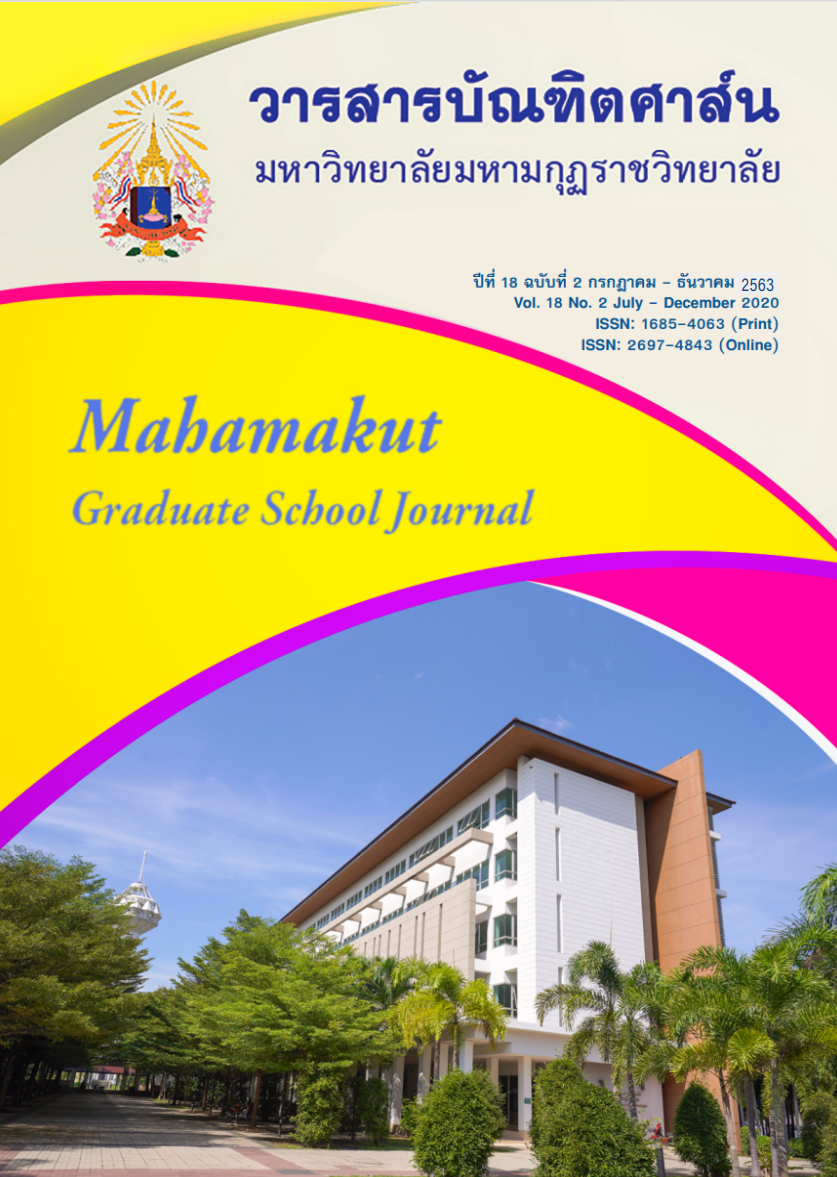บรรยากาศองค์การที่ส่งผลต่อความเป็นองค์การแห่งการเรียนรู้ของมหาวิทยาลัยกรุงเทพธนบุรี
คำสำคัญ:
บรรยากาศองค์การ;, มหาวิทยาลัยกรุงเทพธนบุรี;, ความเป็นองค์การแห่งการเรียนรู้ ;บทคัดย่อ
การวิจัยครั้งนี้มีวัตถุประสงค์เพื่อ 1) ศึกษาบรรยากาศองค์การของมหาวิทยาลัยกรุงเทพธนบุรี 2) ศึกษาความเป็นองค์การแห่งการเรียนรู้ของมหาวิทยาลัยกรุงเทพธนบุรี และ 3) ศึกษาบรรยากาศองค์การที่ส่งผลต่อความเป็นองค์การแห่งการเรียนรู้ของมหาวิทยาลัยกรุงเทพธนบุรี โดยใช้วิธีวิจัยเชิงพยากรณ์ กลุ่มตัวอย่างได้แก่ บุคลากรของมหาวิทยาลัยกรุงเทพธนบุรีจำนวน 286 คน เครื่องมือที่ใช้เป็นแบบสอบถามแบบมาตราส่วนประมาณค่า เกี่ยวกับบรรยากาศองค์การและความเป็นองค์การแห่งการเรียนรู้ ที่มีค่าความเชื่อมั่น เท่ากับ .925 และ .933ตามลำดับ สถิติที่ใช้ในการวิเคราะห์ข้อมูล ได้แก่ ความถี่ ร้อยละ ค่าเฉลี่ย ส่วนเบี่ยงเบนมาตรฐาน สัมประสิทธิ์สหสัมพันธ์ของเพียร์สัน และการวิเคราะห์ถดถอยพหุคูณแบบขั้นตอน
ผลการวิจัยพบว่า
- บรรยากาศองค์การของมหาวิทยาลัยกรุงเทพธนบุรี มีค่าเฉลี่ยโดยรวมอยู่ในระดับดี เมื่อพิจารณาค่าเฉลี่ยเป็นรายด้านพบว่าอยู่ในระดับดีทุกด้าน โดยเรียงลำดับค่าเฉลี่ยจากสูงสุดไปต่ำสุด คือ ด้านความท้าทายและความรับผิดชอบ ด้านโครงสร้างองค์การ ด้านการปฏิบัติงานและความคาดหวัง ด้านความเสี่ยงในงาน ด้านการให้รางวัลและการลงโทษ ด้านความขัดแย้ง ด้านความผูกพันต่อองค์การ ด้านความอบอุ่น และด้านการสนับสนุน
- ความเป็นองค์การแห่งการเรียนรู้ของมหาวิทยาลัยกรุงเทพธนบุรีมีค่าเฉลี่ยโดยรวมอยู่ในระดับมาก เมื่อพิจารณาค่าเฉลี่ยเป็นรายด้านพบว่าอยู่ในระดับมากทุกด้าน โดยเรียงลำดับค่าเฉลี่ยจากสูงสุดไปต่ำสุดคือ ด้านการคิดอย่างเป็นระบบ ด้านการเป็นบุคคลที่รอบรู้ ด้านการสร้างวิสัยทัศน์ร่วมกัน ด้านการมีแบบแผนความคิด และด้านการเรียนรู้ร่วมกันเป็นทีม
- บรรยากาศองค์การที่ส่งผลต่อความเป็นองค์การแห่งการเรียนรู้ของมหาวิทยาลัยกรุงเทพธนบุรี เรียงตามลำดับความสำคัญ ได้แก่ ด้านความขัดแย้ง (TC) ด้านความเสี่ยงในงาน (RI) ด้านความผูกพันต่อองค์การ (OI) และด้านโครงสร้างองค์การ (ST) โดยมีค่าสัมประสิทธิ์การทำนายหรืออำนาจพยากรณ์ ร้อยละ 56.30 (R2 = 0.563) อย่างมีนัยสำคัญทางสถิติที่ระดับ .01 เขียนความสัมพันธ์ในรูปสมการทำนายได้ ดังนี้
สมการคะแนนดิบ = 0.904 + 0.323 (TC) + 0.272 (RI) + 0.118 (OI) + 0.1 (ST)
สมการคะแนนมาตรฐาน y = 0.355 (ZTC) + 0.318 (ZRI) + 0.131 (ZOI) + 0.097 (ZST)
เอกสารอ้างอิง
เจษฎากร ทองแสวง. (2553). แนวทางการพัฒนาองค์กรสู่องค์กรแห่งการเรียนรู้ กรณีศึกษา
มหาวิทยาลัยราชภัฏสวนดุสิต. การค้นคว้าอิสระ. บริหารเทคโนโลยี. มหาวิทยาลัยธรรมศาสตร์.
ธานินทร์ ศิลป์จารุ. (2557). การวิจัยและการวิเคราะห์ข้อมูลทางสถิติด้วย SPSS. พิมพ์ครั้งที่ 15. กรุงเทพฯ : บิสซิเนสอาร์แอนด์ดี.
นุชนาฏ หินอ่อน, (2553). ความสัมพันธ์ระหว่างบรรยากาศองค์การกับความเป็นองค์การแห่งการ
เรียนรู้ของสำนักงานปลัดกระทรวงเทคโนโลยีสารสนเทศและการสื่อสาร. บัณฑิตวิทยาลัย : มหาวิทยาลัยมหิดล.
บุญชม ศรีสะอาด. (2556). วิธีการทางสถิติสำหรับการวิจัย. พิมพ์ครั้งที่ 3. กรุงเทพฯ : สุวิริยาสาส์น.
ปณิตตรา นราภิรมย์ขวัญ. (2559). การจัดการความรู้ของมหาวิทยาลัยในกำกับรัฐและมหาวิทยาลัย
เอกชน. หลักสูตรบริหารธุรกิจมหาบัณฑิต. มหาวิทยาลัยธุรกิจบัณฑิตย์.
พนานันท์ โกศินานนท์. (2551). แนวทางการพัฒนาวิทยาลัยราชพฤกษ์สู่องค์กรแห่งการเรียนรู้. รายงาน การ
วิจัย. วิทยาลัยราชพฤกษ์.
พิชิต เทพวรรณ์. (2550). มิติบรรยากาศองค์การที่มีต่อการพัฒนาองค์การแห่งการเรียนรู้ : แนวปฏิบัติที่ เป็นเลิศของมหาวิทยาลัยนอร์ทเชียงใหม่. รายงานการวิจัย. มหาวิทยาลัยนอร์ทเชียงใหม่.
พีรพงศ์ ทิพนาค. (2558). ความสัมพันธ์ระหว่างการบริหารเชิงกลยุทธ์กับความเป็นองค์การแห่งการเรียนรู้ของคณะศึกษาศาสตร์ มหาวิทยาลัยกรุงเทพธนบุรี. คณะศึกษาศาสตร์. มหาวิทยาลัย
กรุงเทพธนบุรี.
ยุรพร ศุทธรัตน์ (2553). องค์การเพื่อการเรียนรู้. กรุงเทพฯ : จุฬาลงกรณมหาวิทยาลัย.
ลัดดาวัลย์ เพชรวิโรจน์ และคณะ. (2555). ระเบียบวิธีวิจัย. กรุงเทพฯ : พิมพ์ดีการพิมพ์.
วิโรจน์ สารรัตนะ. (2556). ปัจจัยทางการบริหารกับความเป็นองค์การแห่งการเรียนรู้. กรุงเทพฯ :
ทิพยวิสุทธิ์.
ศิรินันท์ แสงสิงห์ และจารุณี ผลพิทักษ์. (2550). ความสัมพันธ์ระหว่างบรรยากาศองค์การและองค์การแห่งการเรียนรู้ : กรณีศึกษา มหาวิทยาลัยศรีนครินทรวิโรฒ. วิทยานิพนธ์. คณะบริหารธุรกิจ. มหาวิทยาลัยศรีนครินทรวิโรฒ.
สมยศ นาวีการ. (2546). การบริหาร. กรุงเทพมหานคร : บรรณกิจ.
อัจฉรา เฉลยสุข. (2556). อิทธิพลของบรรยากาศองค์กรที่ส่งผลต่อความผูกพันขององค์กรคุณภาพการ
ให้บริการ และความพึงพอใจของลูกค้าต่อพนักงาน. วิทยานิพนธ์. คณะบริหารธุรกิจ
มหาวิทยาลัยเทคโนโลยีธัญบุรี.
2. ภาษาอังกฤษ
Ahmad. and Marinah. (2013). Dutch primary School and The Learning Organization.The Learning Organization. 7(3) : pp.145-155.
Atak.(2011).Managing Organizational Behavior. New York: John Wiley & Son.
Garvin, D. A., Edmondson, A. C., and Gino, F. (2008). Is yours a learning organization.
Harvard Business Review School Book. pp. 211 – 216.
Lim, T. (2003). Building the Learning organization.Palo Alto :Califonia Davies- Black.
Litwin, G.H.and Stringer Jr. Robert A. (1968). Motivation and Organizational Climate. Boston : Division of Research, Harward University of Graduate School of Business Administraion.
Poomontre, J. (2005). The Impact of The Learning Organization Dimensions on The
Performance Improvement : The Case Study of Assets Management
Industry in Thailand. Unpublished doctoral’s thesis. The National Institutional Development of Administration, Bangkok.
Rosengarten. (2000). Organization Theory and Management: A Macro Approach.
(online).http://www.Netsquirrel.com/perrerdine/edc634/km/school_as_lo.html.
Ruibyte, L., et.al., (2016). Open Education Resources for Lifelong Learning of
Teachers: Lithuan case. http://www.researchgate.net/ scientific contributions/
2070192616 Laima Ruibyte.
Senge, Peter M. (2006). The fifth discipline : The art and practice of the learning
organization. New York : Boubleday/Currency.
Yamane, Taro (1973). Statistics: An Introductory Analysis. (3rd ed.). Tokyo : Harper International.
ดาวน์โหลด
เผยแพร่แล้ว
รูปแบบการอ้างอิง
ฉบับ
ประเภทบทความ
สัญญาอนุญาต
บทความวิชาการและบทความวิจัยในวารสารฉบับนี้ถือเป็นความรับผิดชอบของผู้เขียนเท่านั้น บทความที่ได้รับการตีพิมพ์ในวารสารบัณฑิตศาส์น ถือเป็นลิขสิทธิ์ของมหาวิทยาลัยมหามกุฏราชวิทยาลัย ตามพระราชบัญญัติลิขสิทธิ์



